2010.10.27
[Event Reports]
10/27 (Wed) Competition Section "If the Seed Doesn't Die" Q&A, Press Conference Notes & Quotes

Date & Time: October 27th (Wednesday), from 16:00 @Movie Caf├® / Q&A from 12:28 TOHO Cinemas Screen 5
Appearance: Sinisa Dragin (director/producer/editor), Ioana Barbu (actress), Simona Stoicescu (actress)

©2010 TIFF
Here are some notes and quotes:
Prior to the press conference, a Q&A session was held at TOHO Cinemas Roppongi Hills Screen 5 following the screening, and Director Gragin and the two actresses stepped out on stage to answer questions.
Sinisa Dragin (SD): In a country where everything is so organized, I suppose the audience here all skipped work to come!
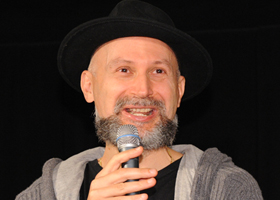
©2010 TIFF
Ioana Barbu (IB): It was a surprise to be able to come to this festival. I hope the film was a surprise to you, too.
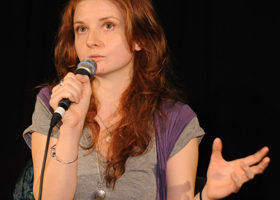
©2010 TIFF
Simona Stoicescu (SS): My heart is still beating very fast because it was the first time I saw the film and IŌĆÖm so impressed! While watching it, I felt the energy of the audience.
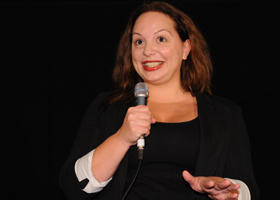
©2010 TIFF
A question was asked on the idea for the story and the title of the film.
SD: The idea of this film came from a legend I read 10 years ago. At that moment, I knew at one point IŌĆÖd make a film about it but I also knew that I didnŌĆÖt want to make a film just about the legend. I wanted to integrate the legend into the present. I needed time to think about how IŌĆÖd make a parallel story between whatŌĆÖs happening in the legend and the people struggling to do something important. The struggle was to find a way connect these together. The title of the film is a passage from the Bible and it was on my mind from the beginning to make it the title. In a way, this title is a key of the film. I prefer that the audience involves themselves to find answers I didnŌĆÖt think about. And many questions regarding the languages and roles were asked during the press conference held later at Movie Café.
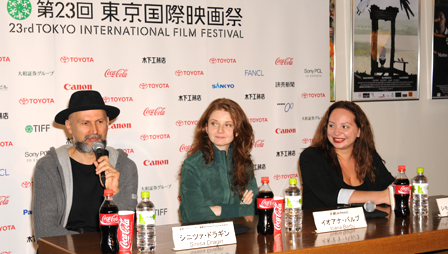
©2010 TIFF
Q: So many languages were used in the film. How many were there?
SD: The multiple languages show the situation of the region. The languages used were Romanian, Serbian, German, English, Spanish, Vietnamese, and Swahili. Hungarian part was cut.
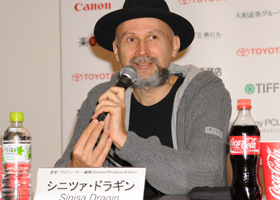
©2010 TIFF
IB: Ioana played the part of a girl who was forced to become a prostitute in Kosovo. Her customers included American soldiers so she spoke some English, and also Romanian.
SS: Nora spoke Serbian, German, and Romanian. It was challenging to learn the lines in German and Serbian!

©2010 TIFF
Q: The taxi driver was speaking Spanish. Why Spanish?
SD: The actor already spoke a little bit of Spanish. Also, after the revolution in Romania, a very large number of people left Romania to work in Spain. For us, it is immediately clear that the taxi driver once lived in Spain working perhaps on a farm, and after his return to Romania, he would use his small knowledge of Spanish words he had learned.
Q: You not only directed the film but you are also the producer and editor. What drove you to make this film?
SD: There are many reasons, different ones according to the film and when I made it. In this film, I wanted to focus on the importance of keeping things as they are. I want the people from where I come from to remain where they are, without having to globalize. Just like the people in the legend. When they are told that they canŌĆÖt build a church, they think of other ways to get what they want. I wanted to communicate the importance of holding on to your principles.
Q: What was your initial reaction to the script?
IB: There are three stories that merge cleverly. I was to play the role of one of the prostitutes, but I worried a bit about the aggressive scene. It was challenging part to play.
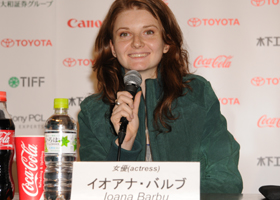
©2010 TIFF
SS: My first reaction was ŌĆśa prostitute again!ŌĆÖ IŌĆÖve played many prostitutes on stage, television, and in films and every prostitute IŌĆÖve played has been a new challenge! Nora wants to have fun; she loves life in all its aspects and tries to make men happy (laugh). This was an important role because I was able to express myself differently and because I loved the script from the very beginning. I was sure that it had potential to become a good film. It was my chance to be part of a big film.
IB: Just as Simona, I also have a history with this kind of role. Before auditioning for this part, I was in a social theater project. Saving the Children is a corporation that helps children in Romania with problems, such as girls taken to places for prostitution. I made a play about this to perform at schools in hopes to alarm girls about this reality. So when I went to audition for this role, I already knew a lot about girls being trafficked. Still, it was difficult to do the rape scene and to watch it. I was glad to see that Sinisa wrapped it up in a very touching way.
SD: Prostitution is an aspect you canŌĆÖt ignore in Eastern Europe and so it is for this film. I wanted to express the anguish of the prostitute that was forced by portraying a contrasting prostitute who was willing to do her job.
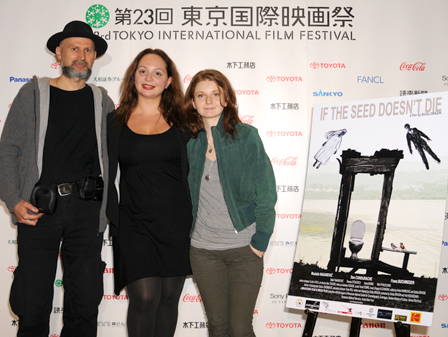
©2010 TIFF
If the Seed Doesn't Die
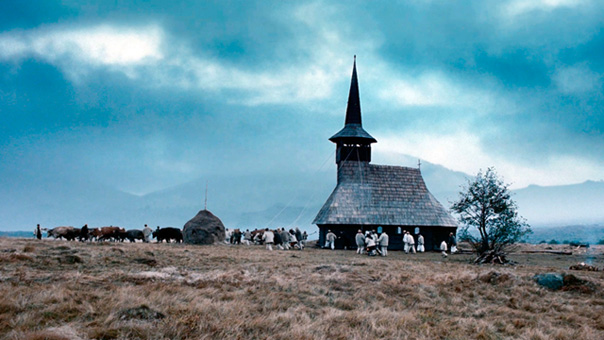
© MRAKONIA FILM, WEGA FILM
Film Information



